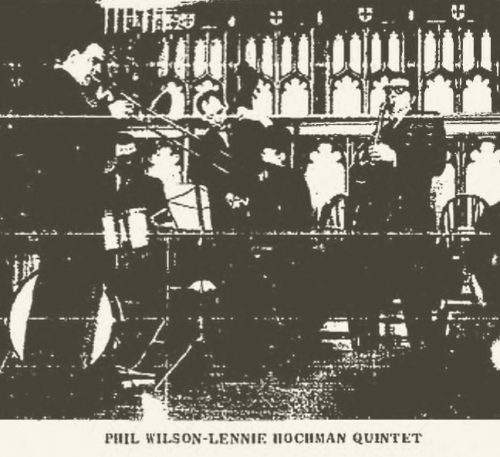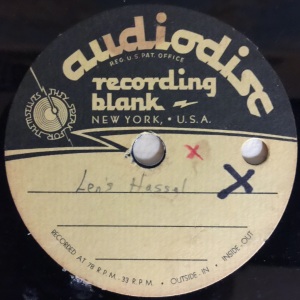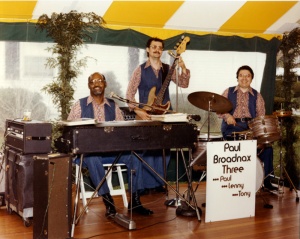In 1968, the Phil Wilson Quartet, featuring ex-Whirlwind Leonard Hochman on sax and bass clarinet, George Moyer on bass, Tony Sarni on drums, and band leader Phil Wilson on trombone, released Prodigal Son: A Christian Worship Service in the Jazz Idiom on Freeform Records.

Phil Wilson Quartet – Prodigal Son (1968) Freeform Records
Recorded live at the Center Congregational Church in Providence, Rhode Island, Phil Wilson’s debut album features a unique interplay between the pastor, Ben Owens, who reads passages, and the quartet, which either provides musical commentary or extended free-form interpretations of the scripture.

Phil Wilson Quartet – Prodigal Son (1968) Freeform Records back
The Phil Wilson Quartet’s “Prologue,” the opening composition on Prodigal Son, is followed by one of the three spoken tracks on side one, “Call to Worship–Psalm 100.”
“Prologue,” featuring Leonard Hochman, George Moyer, Tony Sarni, and band leader Phil Wilson, is on SoundCloud:
Note: If any legal rights holders object to the posting of this rare, out of print, and unavailable track ripped from this correspondent’s personal collection, please drop a line and it will be removed immediately.
The six tracks on side one include four improvised musical pieces by the Phil Wilson Quartet: “Prologue,” “A Song of Joy,” “A Song of Sorrow,” and “Musical Commentary.”

Phil Wilson Quartet – Prodigal Son (1968) Freefrom Records label A
The six tracks on side one include four improvised musical pieces by the Phil Wilson Quartet: “Prologue,” “A Song of Joy,” “A Song of Sorrow,” and “Musical Commentary.”

Phil Wilson – Lennie Hochman Quintet in 1968 (from page 8 of the Bennington Banner, 9 May 1968)
The photo from the Vermont newspaper above was also used on the back cover of Prodigal Son–and was sliced up to create the image on the front of the LP, as well.
“A Song of Sorrow,” the fifth track on Prodigal Son: A Christian Worship Service in the Jazz Idiom, features Leonard Hochman on sax and bass clarinet, George Moyer on bass, Tony Sarni on drums, and band leader Phil Wilson on trombone:
Note: If any legal rights holders object to the posting of this rare, out of print, and unavailable track ripped from this correspondent’s personal collection, please drop a line and it will be removed immediately.
The Reverend Ben Owens begins side two with a reading of the title track, the only piece on the album to combine words and music. This seamlessly transitions to the second “Musical Commentary” by the Phil Wilson Quartet.

Phil Wilson Quartet – Prodigal Son (1968) Freeform Records label B
The remainder of the LP includes spoken tracks and two more pieces of free jazz, “A Song of Giving” and “Epilogue.”
“A Song of Giving,” featuring Leonard Hochman, George Moyer, Tony Sarni, and band leader Phil Wilson, is here:
Note: If any legal rights holders object to the posting of this rare, out of print, and unavailable track ripped from this correspondent’s personal collection, please drop a line and it will be removed immediately.
New England Home Cooking
All four musicians on Prodigal Son were born in New England. George Moyer, the bassist from Boston, worked previously with trumpeter Herb Pomeroy’s big band and many other groups in addition to a long association with the Hartford Symphony Orchestra in Connecticut. Moyer also attended the Berklee School of Music in the late 50s, a Boston area educational institution of international renown that was instrumental in the making of this historic improvisation album. Drummer Anthony “Tony” Sarni, from Boston’s North End (originally from Hull Street), also played with Herb Pomeroy–who was simultaneously a full-time faculty member at Berklee. Sarni earned praise as one of the Paul Champ Three, with bassist Champlain “Champ” Jones and pianist Paul Broadnax. Besides playing in the trio, he played with Steve Lawrence and occasionally worked in Boston area “jingle mills” in the 60s with future bandmate Phil Wilson.

Hap Snow’s Whirlwinds – “Len’s Hassle” (1960) Audiodisc demo
Reedman Leonard Hochman, who in the early and mid 1960s also went by the name Len Arnold when he was playing saxophone in Hap Snow’s Whirlwinds and Lennie Hochman when he was doing various jazz gigs with the Lennie Hochman Quartet or as a sideman, was born in Philadelphia and grew up in Richmond, Virginia. Active in the New York jazz scene in the 1950s, he honed his craft in theaters and night clubs while working with distinguished players and singers including Charlie Barnet, Tony Bennett, Kenny Clarke, Nat “King” Cole, Al Haig, Herbie Mann, Carmen MacRae, Sam Most, Frank Sinatra, Kai Winding, and Phil Woods.
“Len’s Hassle,” an unreleased Hochman original composition cut by Hap Snow’s Whirlwinds at Ace Recording Studios in 1960 featuring Hochman on saxophone, Art Bearon on piano, and Hap Snow on guitar, is on YouTube:
The second unreleased track Hochman did with Hap Snow’s Whirlwinds at Ace Recording Studios in Boston, “(Let’s Have) A Party Tonight,” a Hap Snow composition, featuring Hochman on saxophone, Bearon on piano, and Snow on lead vocals and guitar, is on SoundCloud:
Phil Wilson, born in Belmont, Massachusetts, turned professional at 15, playing with Louis Armstrong, Herbie Hancock, Thad Jones, Frank Sinatra, and Clark Terry among other notable artists. He also toured with the Dorsey Brothers and Woody Herman, and like both bassist George Moyer and drummer Tony Sarni, played with Herb Pomeroy’s band before making Prodigal Son.
A sizzling performance highlighting trumpeters, from left to right, Don Rader, Bobby Shew, Bill Chase, Gerry Lamy, and Dusko Goykovich, clarinet player Woody Herman, trombonist Phil Wilson, and Ronnie Zito on drums, among others, on “My Favorite Things” live around 1964 is online:
Hochman and Wilson’s First Meeting in Virginia
Wilson was playing as a soloist with Woody Herman’s band when he first met Leonard Hochman in Richmond, Virginia in 1963. They met through trombonist Henry Southall, who also played with Herman and “had worked in Richmond, Virginia in clubs with Lennie,” recalls Wilson. It was here Wilson and Hochman first jammed together, a musical relationship that would flourish once Leonard Hochman moved back to Massachusetts for good a year or two later–he first moved to Massachusetts from New York in 1957.

Phil Wilson in England in 1964
A video that showcases, from left to right, Billy Hunt, Danny Nolan, Gerry Lamy, and Paul Fontaine on trumpet, Kenny Wenzel, Phil Wilson, and Henry Southall on trombone, Nick Brignola, Jackie Stevens, Carmen Leggio, and Sal Nistico on saxophone, Nat Pierce on piano, Chuck Andros on bass, Jake Hanna on drums, band leader Woody Herman on sax, and Billy Hunt on trumpet doing a solo on “Days of Wine and Roses” in Montreal, Canada in 1964 is here:
After Leonard Hochman moved to Sharon, Massachusetts, he and Phil Wilson would join other players to do gigs here and there, from bar mitzvahs to theatre and musical work. When asked to describe Hochman’s playing, Wilson stated: “Sound was everything and Lennie had the whole package, it was magnificent.”
A clip of Woody Herman’s band performing “Sister Sadie” in England in 1964, with Herman on vocals and clarinet, Tommy Anastas on baritone sax, Gary Klein and Joe Romano on tenor sax, Bill Chase, Paul Fontaine, Billy Hunt, Danny Nolan, and Gerry Lamy on trumpet, Henry Southall, Phil Wilson, and Kenny Wenzel on trombone, Nat Pierce on piano, Chuck Andrus on bass, Jake Hanna on drums and featured soloist Sal Nistico on tenor sax is on YouTube:
Around 1966, the Phil Wilson Quartet began rehearsing in Leonard Hochman’s basement in Sharon, Massachusetts. They also performed live around the Boston area at venues including Lennie’s on the Turnpike in Peabody, a club that saw acts from pianist Oscar Peterson to a young Jay Leno. Hochman loved to play the music of clarinet and sax player Jimmy Giuffre in this period recalls band leader Wilson. He also played a lot compositions by tenor saxophone player Joe Henderson including music from his 1967 album The Kicker released that autumn. Wilson recalls Prodigal Son was recorded “in the late fall of 1967 but it took nearly a year to put everything together.” This included having to write out the free form pieces of music in order to fulfill the legal requirements at the time.
When asked recently about Hochman’s contribution, Phil Wilson commented: “[we] really listened to each other… [and each party] left their ego at the door… Lennie’s performance on the album has so much spirit and love, and it’s a beautiful, huge sound.”
Post Prodigal Son
Although Prodigal Son was well-received upon debut in 1968, even earning a 4-star review from jazz writer Stanley Dance in the Saturday Review of Literature, the album turned out to be the sole recorded output of the Phil Wilson Quartet. In later years, bassist George Moyer continued his symphonic work while drummer Tony Sarni enjoyed a 15-year run with the Paul Champ Three among other musical projects.

drummer Tony Sarni in the Paul Broadnax Three in the late 60s-early 1970s (jazzhistorydatabase.com)
Leonard Hochman retired from performing after recording the album, although when Phil Wilson joined the New England Conservatory of Music as chairman of the jazz division in 1974, Hochman enrolled as a student in two or three classes between 1974 and 1976, including one which featured a group called the Uptown Blues Band. Hochman played several concerts with the band and “brought love and tremendous enthusiasm to the project” recalls Wilson–another talented student in the class was drummer Anton Fig who later joined David Letterman’s house band. Other than composing music for a Broadway play in 1976, Hochman focused on family and work until the early 90s, when he began appearing on stage again.
Leonard Hochman’s original composition, “The Dragon,” which features Harvie S on bass, Alan Dawson on drums, Chris Taylor on piano, Ella Lou Weiler on viola, Mitch Seidman on guitar, and Hochman on bass clarinet is on YouTube:
In 1994 Hochman was on Mitch Seidman’s Fretware with Harvie S, Alan Dawson, Charlie Kohlhase and then released his first album as a band leader, Until Morning, which also featured Swartz, Dawson, Seidman, as well as Eula Lawrence, Chris Taylor, and Ella Lou Weiller. His two albums the next year, Mitch Seidman’s Ants In a Trance and his own Manhattan Morning, with Kenny Barron, Victor Lewis, Harvie S, and Joe Locke, earned rave reviews, the latter being named one of the top five CDs of the year by The Jazz Times among other honors.

Leonard Hochman photo crop from Fretware (1994) CD booklet
Leonard Hochman’s original composition “Greystone,” which features Kenny Barron on piano, Harvie S on bass, Victor Lewis on drums, Joe Locke on vibraphone, and Hochman on bass clarinet, is online:
Being a member of Woody Herman’s band in the 50s and 60s meant “you had two weeks off in two years,” recalls Phil Wilson. When Wilson met Leonard Hochman in 1963, for example, he had been on the road since 1957 and like Hochman, was ready to “settle down and start a family.” In fact, it is in this time frame Hochman began the process of leaving the stage and founding a successful instrument rental and and sales business, the Arnold Music Company.
An Idea That Continues To Pay Dividends 50 Years Later
As the two road-hardened musicians discussed transition to a more sedentary existence, Leonard Hochman suggested Phil Wilson consider teaching and set up an interview for him at the Berklee School of Music. This excellent idea continues to pay dividends nearly 50 years later, as Wilson started teaching at Berkelee in September 1965 and in January 2014 is still developing new approaches to playing the trombone and teaching brass technique in the new semester which just got underway. Things have changed a bit, however, compared to that initial year when Wilson was one of a dozen teachers who “taught everything,” were paid little, but remained involved because “it was the music we loved, it was food for us.” In that first year, out of 419 students, the graduating class equaled the number of players in an octet. Last year, in comparison, the graduating class was made up of 908 students, including future musicians and educators from more than 80 countries.

a recent photo of Phil Wilson (www.berklee.edu/news/2220/phil-wilson-receives-lifetime-achievement-award)
After Prodigal Son, Phil Wilson has gone on to release more than a dozen albums including his most-recent, 2005’s The Music of Antonio Carlos Jobim on Capri records.

Phil Wilson’s Pan-American All-Stars Celebrate The Music Of Antonio Carlos “Tom” Jobim (2005) Capri Records
A few career highlights include playing in front of more than 100,000 fans at a free open air concert with Judy Garland on the Boston Common in 1967.
One of five clips of the show, audio only, is posted on You Tube:
In 1968, Phil Wilson composed music for the Buddy Rich Orchestra. Wilson has appeared on Marian McPartland’s Piano Jazz on NPR, in 2001. He also formed the International Dues Band in 1965, one of the Berklee College of Music’s oldest and most prestigious ensembles. Later renamed The Rainbow Band to reflect the diversity of the school’s increasing numbers of international students (approximately 30% of the student body in 2013), Wilson has taken the contemporary jazz group on national TV and to play with the Boston Symphony Orchestra.
Phil Wilson’s recent live performance at the Berklee Performance Center, “I Love You,” with pianist Josh Gallagher, is here:
“What Is This Thing Called Love,” showcasing the dueling trombones of Phil Wilson and Paul Nowell, with Josh Gallagher on piano, is also online:
And something very special, a 55-minute clip of a Woody Herman concert in England in 1964 that features Tommy Anastas, Gary Klein, Sal Nistico, and Joe Romano on tenor sax, Anastas on baritone sax, Bill Chase, Paul Fontaine, Billy Hunt, Danny Nolan, and Gerald Lamy on trumpet, Henry Southall, Phil Wilson, and Kenny Wenzel on trombone, Nat Pierce on piano, Chuck Andrus on bass, Jake Hanna on drums, and band leader Herman on vocals, clarinet, and alto saxophone.

Phil Wilson with Woody Herman’s band in England in 1964
Songs include “After You’ve Gone” by Turner Layton and Henry Creamer, “Sig Ep” by John C. Gale, “That’s Where It’s Is” by Teddi Castion, “Lonesome Old Town” by Charles Kisco and Henry Tobias, featuring a long solo by Phil Wilson, “Sister Sadie” by Horace Silver, “Better Git It In Your Soul” by Charles Mingus, “Hallelujah Time” by Oscar Peterson, Malcolm Dodds, and Harriette Hamilton, “Don’t Get Around Much Anymore” by Duke Ellington and Bob Russell, “Jazz Me Blues” by Tom Delaney, “Days Of Wine And Roses” by Henry Mancini and Johnny Mercer, “Four Brothers” by Jimmy Giuffre, “To Sum It Up” by Nat Pierce, and “Caldonia” by Fleecie Moore:
References
AllMusic.com – Leonard Hochman
Berklee Faculty Profile – Phil Wilson
Berklee 2013 High School Jazz Festival Dedication – Phil Wilson
StereoTimes.com – Leonard Hochman
Trombone Page of the World – Phil Wilson
“Epilogue,” A Final Track from Prodigal Son
“Epilogue,” the final last cut on Prodigal Son: A Christian Worship Service in the Jazz Idiom featuring Leonard Hochman on sax and bass clarinet, George Moyer on bass, Tony Sarni on drums, and band leader Phil Wilson on trombone, is on SoundCloud:
Note: If any legal rights holders object to the posting of this rare, out of print, and unavailable track ripped from this correspondent’s personal collection, please drop a line and it will be removed immediately.
(This Spotlight on the Phil Wilson Quartet’s Prodigal Son was first published 13 January 2014. This upgraded version adds new content including album tracks from an LP it took this correspondent more than three years to finally run down.)